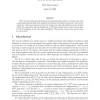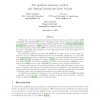20 search results - page 1 / 4 » Weak Adversaries for the k-Server Problem |
FOCS
1999
IEEE
13 years 9 months ago
1999
IEEE
STOC
1991
ACM
13 years 8 months ago
1991
ACM
In this paper, we prove lower bounds on the competitive ratio of randomized algorithms for two on-line problems: the k-server problem, suggested by [MMS], and an on-line motion-pl...
ALT
2010
Springer
13 years 6 months ago
2010
Springer
: In many prediction problems, including those that arise in computer security and computational finance, the process generating the data is best modeled as an adversary with whom ...
COCO
2005
Springer
13 years 10 months ago
2005
Springer
We introduce two new complexity measures for Boolean functions, which we name sumPI and maxPI. The quantity sumPI has been emerging through a line of research on quantum query com...
STOC
2005
ACM
14 years 5 months ago
2005
ACM
Assume that Alice and Bob, given an authentic channel, have a protocol where they end up with a bit SA and SB, respectively, such that with probability 1+ 2 these bits are equal. ...


